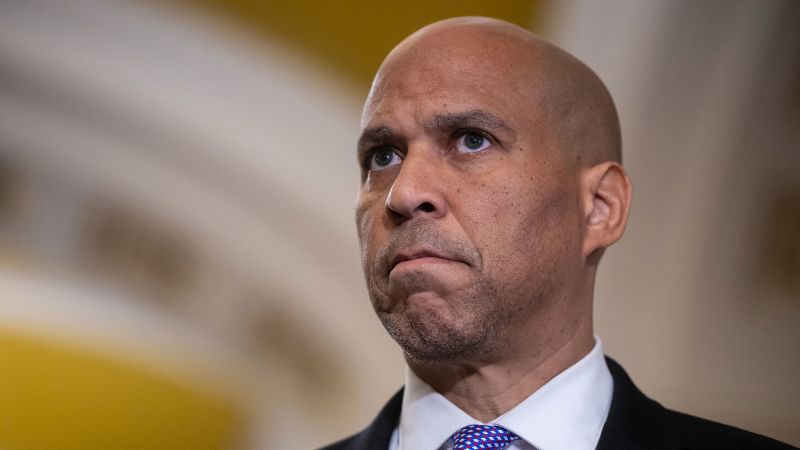In a fervent appeal to the Democratic Party, Senator Cory Booker has taken a strong stance against former President Donald Trump, urging party leaders to adopt a more aggressive approach in their opposition to his policies and administration. During an extensive interview with CNN’s Manu Raju, Booker expressed his concern over the political landscape, suggesting that history will hold accountable those who display “complicity” and fail to resist what he perceives as authoritarian tendencies from Trump. He implies that inaction or submission to Trump’s will could tarnish the legacy of those who ought to be standing firm.
Booker emphasized that Democrats should prioritize the concerns of the American populace over partisan interests. He indicated that the party could build trust and credibility with voters if it actively demonstrates a commitment to addressing their needs. With a call for unity among party members, Booker also touched upon the necessity for the Democratic Party to acknowledge its progressive wing, which is increasingly being championed by voters looking for bold leadership. He championed redistricting efforts, particularly in New Jersey, to counteract the GOP’s strategic advantage in states like Texas, which have been led by Trump’s redrawing initiatives.
As Democrats show a growing impatience for their leaders to take a firmer stance against Trump, Booker declared he would continue to exemplify true leadership by condemning institutions that he believes have yielded to the pressures exerted by the former president. In his remarks, he recounted various entities—from law firms to major corporations—that have opted to compromise their principles in order to gain favor with Trump, asserting that such decisions are “outrageous.” He articulated his belief that these actions are not only unbecoming but will ultimately be remembered in history as a failure to confront a figure he claims is undermining democracy itself.
Delving deeper into the actions he deems necessary, Booker highlighted the constitutional violations he attributes to Trump, arguing that Democrats are complacently allowing the erosion of governmental norms to transpire. He scolded party leadership for not taking a firmer stand against Trump’s tactics. With urgency in his tone, he challenged his peers, asking how far the party would let Trump go without drawing a clear line against what he describes as rising authoritarianism. Through impassioned language, Booker underscored the critical need for Democrats to advocate for the values they represent, rather than capitulating to pressures that may compromise these ideals.
Additionally, Booker has been vocal in his opposition to policies being adopted by various state administrations that he views as politically motivated. In particular, he criticized the withholding of federal grants by the Trump administration and stressed that such practices are disingenuous and detrimental to blue states—reinforcing his argument that compliance with Trump’s directives has resulted in significant harm to state jurisdictions.
Amid these discussions, the spotlight has also shifted to the Democratic Party’s strategy for redistricting in the future. Booker expressed the need for Democrats to engage in tactical redrawing of congressional maps, especially given the aggressive maneuvers undertaken by Republicans in Texas. He implies that the urgency for Democrats to act decisively may outweigh previous commitments to nonpartisan approaches in redistricting as they seek to maintain or regain significant representation.
This political rallying cry from Booker comes as a reflection of increasing frustrations felt by many in the Democratic base who are searching for leadership that mirrors their progressive aspirations. There is a visible shift toward more radical ideologies as figures like Zohran Mamdani, a democratic socialist who gained attention after his unexpected primary victory in New York City, begin to capture the imagination of younger voters.
In his closing thoughts, Booker exhibited a blend of pragmatic enthusiasm and community spirit, recognizing New York City’s individuality in its electoral choices while reaffirming his focus on state-level dynamics in New Jersey. His engagement in these discussions encapsulates a broader movement within the Democratic Party, showing that the call for resistance, accountability, and an aggressive stance against Trump and his supporters is resonating deeply among its members.











